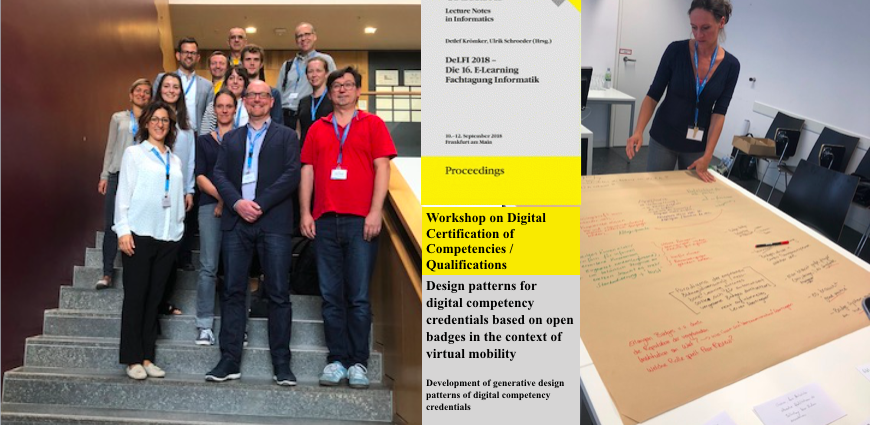The Open Virtual Mobility project was presented at the DeLFI Workshop on Digital Certification of Competencies as part of the DeLFI 2018 conference at Goethe University in Frankfurt, Germany.
The DeLFI conferences are popular annual conferences in computer science with focus on e-learning and deal with all aspects of computer science of internet-, media- and computer-supported forms of teaching and learning in schools, universities, vocational and private education and training. The contributions to DeLFI conferences focus on e-learning methods and tools are open to all disciplines.
The DeLFI Workshop on Digital Certification of Competencies was organised by Prof. Johannes Konert andProf. Ilona Buchem from Beuth University (OpenVM Coordinators), Prof. Christoph Rensing from TU Darmstadt and Anja Lorenz and Dr. Christine Brunn from TH Luebeck. The aim of the workshop was to bring together researchers from the participating disciplines on the subject of digital credentials to explore possibilities and challenges from an interdisciplinary perspective, e. g. semantic technologies for competence modelling, graph algorithms and graph databases, digital certificates (e.g. public-key certificates), methods for (semi-)automatic competence assessment.
The workshop included presentations and discussions about practicable combination of technologies that can complement (and replace in the long term) traditional competency/qualification certificates with the aim of validation and recognition of non-formal, informal and digital learning, improving the permeability of the education system (primary, secondary, tertiary), and contributing to the increasing mobility.
In this context Ilona Buchem presented the research paper accepted for publication in the conference proceedings titled:
“Design patterns for digital competency credentials based on open badges in the context of virtual mobility. Development of generative design patterns of digital competency credentials.”
Here is the abstract in English:
Abstract: Open badges are a metadata standard for digital signalling and documentation of competencies and achievements. Digital credentials on the basis of open badges are used in various educational contexts to signal competencies to be acquired and to document competencies acquired at certain points in time (formatively and/or summatively). This enables digital documentation of competency development in relation to progress (e. g. levels) and scope (e. g. types of competencies). The various designs of digital competency credentials can be abstracted into design patterns. This paper presents the development of generative design patterns, i.e. generalised solution forms, of digital competency credentials based on open badges in context of virtual mobility.
And the slides on SlideShare:


